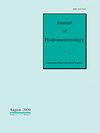Atmospheric Flash Drought in the Caribbean
IF 2.9
3区 地球科学
Q2 METEOROLOGY & ATMOSPHERIC SCIENCES
引用次数: 0
Abstract
Despite the intensifying interest in flash drought both within the U.S. and globally, moist tropical landscapes have largely escaped the attention of the flash drought community. Because these ecozones are acclimatized to receiving regular, near-daily precipitation, they are especially vulnerable to rapid-drying events. This is particularly true within the Caribbean basin where numerous small islands lack the surface and groundwater resources to cope with swiftly developing drought conditions. This study fills the tropical flash drought gap by examining the pervasiveness of flash drought across the pan-Caribbean region using a recently proposed criterion based on the Evaporative Demand Drought Index (EDDI). The EDDI identifies 46 instances of widespread flash drought “outbreaks” in which significant fractions of the pan-Caribbean encounter rapid drying over 15 days and then maintain this condition for another 15 days. Moreover, a self-organizing maps (SOM) classification reveals a tendency for flash drought to assume recurring typologies concentrated in either the Central American, South American, or Greater Antilles coastlines, though a simultaneous, Caribbean-wide drought is never observed within the 40-year (1981-2020) period examined. Further, three of the six flash drought typologies identified by the SOM initiate most often during Phase 2 of the Madden-Julian Oscillation. Collectively, these findings motivate the need to more critically examine the transferability of flash drought definitions into the global tropics, particularly for small water-vulnerable islands where even island-wide flash droughts may only occupy a few pixels in most reanalysis datasets.加勒比地区的大气闪旱
尽管美国国内和全球对闪旱的关注不断加强,但潮湿的热带景观在很大程度上却没有引起闪旱研究界的注意。由于这些生态区适应了定期、近乎每天一次的降水,因此特别容易受到快速干旱事件的影响。加勒比海盆地的情况尤其如此,那里的众多小岛缺乏地表水和地下水资源,无法应对迅速发展的干旱状况。本研究利用最近提出的基于蒸发需求干旱指数(EDDI)的标准,研究了泛加勒比海地区普遍存在的闪电干旱,填补了热带闪电干旱的空白。蒸发需求干旱指数确定了 46 次大范围的干旱 "爆发",在这些干旱 "爆发 "中,泛加勒比海的大部分地区在 15 天内迅速干燥,并在随后的 15 天内保持这种状态。此外,自组织地图(SOM)分类显示,尽管在所研究的 40 年(1981-2020 年)期间从未观察到全加勒比海同时发生干旱的情况,但闪旱有一种集中在中美洲、南美洲或大安的列斯群岛海岸线反复发生的趋势。此外,在 SOM 确定的六种闪电干旱类型中,有三种类型最常在马登-朱利安涛动的第二阶段发生。总之,这些发现促使我们有必要更严格地审查闪旱定义在全球热带地区的可转移性,特别是对于易受水影响的小岛屿,因为在大多数再分析数据集中,即使是全岛闪旱也可能只占几个像素。
本文章由计算机程序翻译,如有差异,请以英文原文为准。
求助全文
约1分钟内获得全文
求助全文
来源期刊

Journal of Hydrometeorology
地学-气象与大气科学
CiteScore
7.40
自引率
5.30%
发文量
116
审稿时长
4-8 weeks
期刊介绍:
The Journal of Hydrometeorology (JHM) (ISSN: 1525-755X; eISSN: 1525-7541) publishes research on modeling, observing, and forecasting processes related to fluxes and storage of water and energy, including interactions with the boundary layer and lower atmosphere, and processes related to precipitation, radiation, and other meteorological inputs.
 求助内容:
求助内容: 应助结果提醒方式:
应助结果提醒方式:


